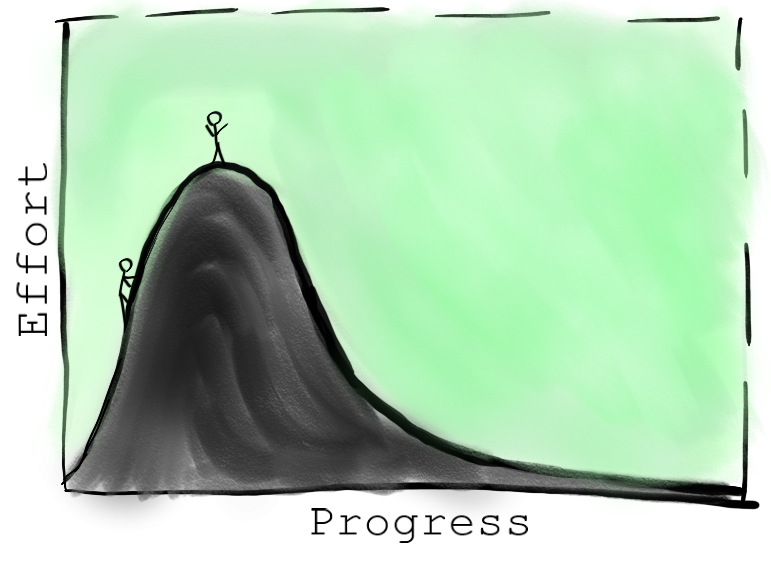Please note that I am about to give you exceptionally bad advice, so please do not follow it:
I think every student should make every effort to skip their introductory courses.
Why? Well, it starts with a TV show:
In Season 5 of Silicon Valley, the CEO, named Richard, of a fictional company embarrasses himself during his first company-wide speech. He stumbles his words, almost poops his pants, and then continues to throw himself into a glass wall in front of all his employees. After the incident, he decides to not give an orientation week to everyone for fear of future embarrassment. This lack of orientation wreaks havoc amongst the company as people are confused as to what they should be doing. All of this culminates in Richard working for days on end trying to do everyone else’s jobs. As people start to notice his crazy work ethic, they start to paradoxically respect him and start to figure out their own jobs in an effort to help out.
Eventually the exhausted Richard ends up in hospital after running into another glass wall. When he wakes up and returns to the office, he finds that everyone is united and working together, inspired by his efforts.
While the whole episode is a hoot, I often find myself returning to one specific line:
“I mean, sure, a three-day orientation might’ve been just as effective and less bloody, but it wasn’t you.”
I find this comedic parable to be inspiring because it somewhat encapsulates my entire philosophy of learning. There have been many times in life where it would have been both easier and less bloody to just go to orientation or sit through an introductory class, yet I have found that putting myself in a position where I have no idea what I am doing is actually where I am most comfortable.
To explain myself better, I present to you the curve of learning:
I think that the beginning of most problems people face can be approximately mapped to the curve above. The y-axis is effort, and the x-axis is progress. At the beginning of any problem, you exert a lot of effort for (seemingly) very little progress. Yet, as you go further, you continue to get more ‘bang for your buck’.
Most people (including myself) see that big hump and get very scared, and for good reason. The hump is where we risk wasting most of our time. It has been known to cause panic attacks and decimate self-confidence. The reason we have orientations and introductory classes is solely to make going over the hump as easy as possible.
Yet, I have found the gut-wrenching solo climb up the hump to be an almost enjoyable experience. At first, I did not understand why I liked it; the hump is always painful and humiliating. In fact, the hump is often where I am most unhappy. The days I spend in the hump are filled with self-loathing, but somehow, I always end up on the other side, a little wiser and a lot humbler. Over time, I finally started to understand why I liked the hump. It’s not because I’m a masochist, but rather because my goal when approaching problems was not actually to solve the problem, but to understand the problem.
This realization changed my whole perspective. I enjoy the hump because it is an exciting journey that makes the world around me smaller and simpler. The journey over the hump allows me to explore what went through the minds of the people who were the first to ever encounter a particular problem.
You see, when you learn introductory maths or sciences, you are taught an overbearing amount of concepts, equations, and laws. They are presented as if these truths were self-evident. They aren’t. Every law, equation, and idea in your textbook took a number of people their entire lives to figure out, yet your teachers expect you to master it in 2 weeks. By forsaking introductory classes, I gained an appreciation for just how difficult seemingly basic concepts are.
The hump also is not a singular hill. It is but one peak in a landscape of related problems. By exploring the hump on your own you have the time to look around you and see what problems are related to the one you are tackling now. In this way, you start to develop connections between different fields, connections that you would have otherwise missed.
Again, I do not recommend climbing the hump on your own. Skipping class is bad advice. You will get worse grades, your teachers will be annoyed, and you will look like a fool asking redundant questions. Exploring the hump on your own is always more bloody and often less effective than simply going to orientation.
Yet, if you are okay with a little blood and a lot of frustration, then I can tell you that my way is way more exciting. By ignoring the beaten path, you will come out the other side a lot humbler and perhaps a little wiser. You won’t learn the material as fast, but you will be more intimate with what you do know. Soloing the hump is hard, but as far as bad advice goes, its not the worst advice I could give you.



